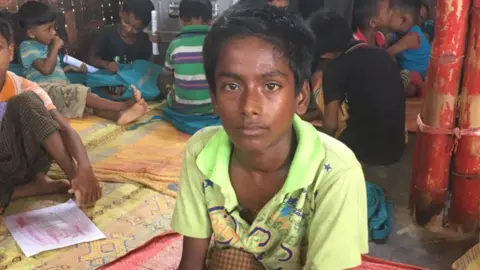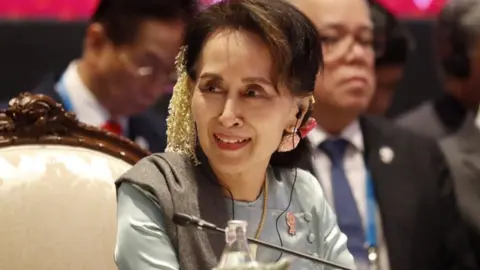Myanmar Rohingya: Will Omar get justice for his murdered family?
 BBC
BBCSitting on the floor of his makeshift school in the sprawling refugee camp of Cox's Bazar in Bangladesh, 11-year-old Omar spoke softly as he remembered his mother and father.
"My parents loved me so much. They looked after me very well," he said.
He explained how his parents were murdered by the Myanmar army in August 2017. Three of his brothers and two of his sisters were also killed.
"When I wake up every morning I start crying. Then I wipe my tears away and I get ready to go to school," he said.
Two years on, it is still hard to process the brutality of what happened to Omar and his fellow Rohingya who had been living in Myanmar - or Burma as it was previously known.
You would be forgiven for assuming such stories would have brought swift and decisive international action. They did not. Visible progress towards any kind of justice for the minority Muslim group has been painfully slow.
But now we've seen three legal developments - seemingly unrelated - which some legal experts are calling a big step forward, and which offer a degree of hope to Rohingya campaigners.
Why aren't Myanmar's generals already in court?
UN inspectors said in September 2018 that top officers in Myanmar's army should stand trial accused of genocide for their brutal security crackdown in Rakhine state the previous year, which drove more than 700,000 Rohingya into Bangladesh.
The easiest way for this to happen would be for the UN Security Council to refer the case to the International Criminal Court (ICC) which prosecutes alleged war criminals.
But there are two problems: Firstly, China - which is Myanmar's powerful neighbour and ally - would almost inevitably block a referral. And secondly, Myanmar does not recognise the ICC.
However, in the first of our legal developments, the ICC has said it will start a full investigation into crimes committed across the border in Bangladesh, a country which does recognise the court. These crimes include forced deportation by Myanmar - that is, making the Rohingya leave their homeland - but not the most serious of war crimes, including genocide.
Laetitia van den Assum, a member of an independent commission into Rakhine state led by the late former United Nations Secretary-General Kofi Annan, told the BBC: "This full investigation is supposed to lead to actual indictments of individuals."
It's true progress may be slow. "If you are in a central position of power you are protected," she said. "No-one will send you to the Hague."
But the Dutch former diplomat says there's no guarantee that Myanmar's generals will be safe forever and points to the example of war criminals, including Slobodan Milosevic, Ratko Mladic and Radovan Karadzic, who finally stood trial after years evading justice.
Myanmar says the ICC has no legal right to investigate what happened and that its government has already set up an Independent Commission of Enquiry. Myanmar's military also denies war crimes and says it is carrying out its own investigation.
What's going to happen to Aung San Suu Kyi?
Nobel Peace Prize Laureate Aung San Suu Kyi has led Myanmar's civilian government since 2016. Under the constitution, she has no control of the military which remains extremely powerful politically.
 EPA
EPABut she has been widely accused of failing in her duty to protect the human rights of the Rohingya. UN investigator Christopher Sidoti has said the longer the army keeps on targeting ethnic minorities "the more impossible it is for the civilian side of the government to escape international criminal responsibility".
In our second legal development, which shows the breadth of condemnation of Ms Suu Kyi, she was named alongside senior generals in a case filed in a court in Argentina. The lawsuit has been brought by human rights groups under the principle of "universal jurisdiction", which means that some crimes are so despicable they can be tried anywhere in the world.
Myanmar's government has dismissed the move, but if proceedings in the Argentine court led to an extradition request for Ms Suu Kyi being issued, it could limit her travel. Her destinations would only be friendly countries which would not give her up.
It's a long way off, but would represent just how far this one-time global human rights icon had fallen. From "Asia's Mandela" to international fugitive.
How is The Gambia now involved?
The tiny west African country of The Gambia has provided our third legal development by lodging a lawsuit against Myanmar at another high profile court - the International Court of Justice (ICJ) - also based in the Hague.
Myanmar has to recognise this particular court because it signed up to the 1948 Genocide Convention, which not only prohibits states from committing genocide but also compels all member states to prevent and punish the crime of genocide.
The Gambia, which is a mainly Muslim country, has the support and funding of the Organisation for Islamic Cooperation (OIC), which has 57 member states.
Myanmar says it is considering its legal response to this case.
The ICJ has no police force or way of enforcing any of its rulings, but Myanmar's international reputation would be further damaged if it acted against the decisions of the court.
So what happens next?
Next month we may see the first hearing at the International Court of Justice (ICJ) where The Gambia has also asked the court to grant so-called "provisional measures" to make sure Myanmar immediately stops ongoing alleged atrocities against the Rohingya.
Khin Maung Myint, one of few prominent Rohingya activists still in Myanmar, told me he cautiously welcomed all three legal moves.
"This is full-blown genocide and now the case is mounting up. We have to wait and see but I don't think the international community are going to bluff on this issue. If they bluff and don't take responsibility they will be complicit in the ongoing genocide against the Rohingya."
But there are warnings that progress in what will be long and complex legal battles should not detract from the continuing suffering of the stateless Muslim minority.
Kingsley Abbott, senior legal adviser at the International Commission of Jurists, has said it is "critical that victims sitting inside Myanmar and Bangladesh are not left behind".
"They must be consulted and provided the opportunity to participate in these initiatives to the fullest extent possible. Myanmar itself must alter course and start ensuring full accountability for serious human rights violations that have occurred within the country."
So for now, none of this latest flurry of legal activity will give immediate respite to the estimated 400,000 Rohingya still suffering in Rakhine - denied citizenship, free movement and access to healthcare and education.
Nor does it help the one million Rohingya languishing in the refugee camps of Bangladesh, including Omar, the orphan who misses his murdered mum and dad and siblings so much.
He's already had his childhood stolen and it seems he could be well into adulthood before there's any chance those who ordered the rape, murder and expulsion of his people will be brought to book.
